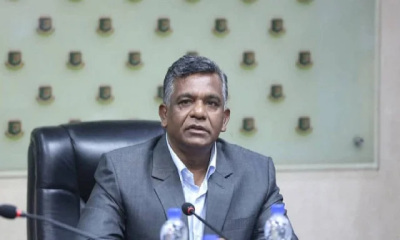Heath Streak, the former Zimbabwe captain and arguably their greatest allrounder, has died at the age of 49. He had advanced colon and liver cancer and had been receiving specialist treatment at a Johannesburg hospital, travelling from his home in Bulawayo on a bi-weekly basis since May. He is survived by his wife, Nadine, and four children.
"In the early hours of this morning, Sunday the 3rd of September 2023, the greatest love of my life and the father of my beautiful children, was carried to be with the Angels from his home where he wished to spend his last days surrounded by his family and closest loved ones," Nadine wrote on social media.
Streak was a major figure in the Zimbabwe team of the 1990s, when they enjoyed their most successful run in international cricket. He represented Zimbabwe in 65 Tests, making him their second-most capped Test player, and 189 ODIs between 1993 and 2005. He was their leading bowler, with 216 Test wickets and 239 ODI wickets - also the only Zimbabwe bowler to take more than 100 Test wickets and over 200 ODI wickets. He was also their seventh-highest Test run-scorer, with 1990 runs, and one of 16 Zimbabwe batters to score more than 2000 ODI runs, finishing with 2943.
The son of Denis, who played cricket for Rhodesia, Streak made his international debut as a 19-year-old in an abandoned match against South Africa in Bengaluru during the 1993 Hero Cup, a five-team tournament played in India. He also got his Test cap that year, against Pakistan in Karachi, and took eight wickets in the next match in Rawalpindi.
Pakistan would become something of a favourite opponent. He took more Test wickets - 44 - against them than any other team, including three of his seven five-fors.
He made his first Test fifty in his ninth Test, against South Africa, and it would be followed by 10 more. His only Test century came against West Indies, in Harare in 2003.
After making his debut, Streak played in all eight Tests that Zimbabwe won over the course of his career. He was a mainstay of the ODI side and played in three World Cups - in 1996, 1999 and 2003 - and took 3 for 36 and 3 for 35 in their wins over India and South Africa in the 1999 tournament in England.
Streak became Zimbabwe captain in 2000, but it proved a tumultuous tenure.
In 2001, he resigned for the first time, officially citing the impact of leadership on his performance. Behind the scenes, politics was rife in the country, and Streak was in the crosshairs.
As part of Zimbabwe`s white, privileged minority, his family was targeted in the land-reform projects of the early 2000s, where white farmers` lands were seized and redistributed. More than 70% of the Streaks` farm in the Turk Mine area, 60 kilometres north of Bulawayo, was taken but they were left with enough to continue farming cattle and run a small safari park.
In sporting terms, the increased political push to transform Zimbabwe`s previously elite sporting codes, such as cricket and rugby, into representative games meant the introduction of quota systems. And all the while, Zimbabwe`s economy suffered. Selection interference and payment issues were behind Streak`s first resignation as captain but he accepted the job again in 2002, and led them at the 2003 World Cup, where Zimbabwe were co-hosts.
The difficulties never went away, though, and in 2004, Streak resigned as captain for the second time after a clash with the board, prompting the walkout of 13 other white players from the national side. That was a pivotal moment for Zimbabwe cricket and led to them rebuilding the national side with inexperienced players, which resulted in a sharp decline in results. Streak was the only one of the players who returned to the national side and made an international comeback the following year. He played six Tests and six ODIs (two for Africa XI against Asia XI in August 2005) before retiring from international cricket at the age of 32 in 2005.
Streak went on to play for Warwickshire and had a short-lived stint as captain before leaving the club in 2007. He then signed up with Ahmedabad Rockets in the short-lived Indian Cricket League. From there, he returned to Zimbabwe and moved into coaching. He was appointed Zimbabwe`s bowling coach in 2009 and went on to work under Alan Butcher as Zimbabwe made their Test comeback after a six-year self-imposed exile in 2011. They enjoyed fairly regular game time over the next two years but in 2013, Streak`s contract was not renewed. He remained coach at his domestic union, Matabeleland Tuskers, and founded his own academy, the Heath Streak Academy, in Bulawayo in 2014.
He also found gigs as a bowling coach around the world and had stints with Bangladesh (2014-2016) and Gujarat Lions (in the 2016 and 2017 editions of the IPL) and then returned home to take over as Zimbabwe`s head coach in October 2016, tasked with ensuring the team qualified for the 2019 World Cup. At the 2018 World Cup qualifier held in Zimbabwe, the team lost a crucial match to the UAE and missed out on the World Cup. Streak and his entire coaching staff were sacked. He went on to have short stints with Scotland, Somerset and Kolkata Knight Riders.
In 2021, he was banned for eight years after being charged with - and admitting to - five breaches of the ICC`s anti-corruption code, including accepting payment in bitcoins from a potential corruptor. However, he later said he was not involved in any attempts to fix matches, but admitted to disclosing inside information pertaining to international matches.
As such, he was serving his ban at the time of his death. Streak would have been 57 at the time the ban ended and had expressed doubts on whether he would be able to return to having a role in the game. He was understood to be considering appealing the length of his ban before he took ill.
His academy continues to run and was renamed the Zimbabwe Youth Academy when Streak had to resign last year. He spent his final months fishing and tending to the family farm.
This article was first published in ESPN Cricinfo.





-20260217073221.webp)




-20260219110716.webp)

-20260219054530.webp)























